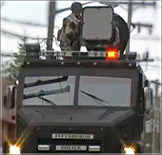Professor Sues Pittsburgh for Zapping Her With Weapon Developed to Fight TerroristsBy KEVIN KOENINGERCourthouse News Service Sep. 26, 2011 |
Popular 
Trump Confronts South African President on White Genocide

Israeli PM Netanyahu: Trump Told Me 'I Have Absolute Commitment to You'

Rep. Randy Fine: Pro-Palestine Movement Are 'Demons' Who 'Must Be Put Down by Any Means Necessary'

ADL Responds to DC Shooting With Call to Deplatform Twitch Streamer Hasan Piker

Trump, After Rearming Israel, 'Frustrated' With Netanyahu for Expanding War
  PITTSBURGH (CN) - An English professor says she suffered "permanent hearing loss, nausea, pain and disorientation" when Pittsburgh police used a Long Range Acoustic Device, developed to fight terrorists, on a peaceful demonstration against the IMF, in which she was not participating, but merely watching. PITTSBURGH (CN) - An English professor says she suffered "permanent hearing loss, nausea, pain and disorientation" when Pittsburgh police used a Long Range Acoustic Device, developed to fight terrorists, on a peaceful demonstration against the IMF, in which she was not participating, but merely watching.Karen Piper sued Pittsburgh and its police force for negligence, civil rights and constitutional claims, in Federal Court. "During the G-20 Summit Meeting held in Pittsburgh in September 2009, City of Pittsburgh Police used a Long Range Acoustic Device (LRAD) against civilians on or about the streets of Pittsburgh," the complaint states. "The LRAD, a distance hailing and crowd control device, was developed in response to the terrorist attack on the USS Cole in October 2000, and was originally intended to be used by American warships to warn incoming vessels approaching without permission. Among other things, it emits harmful, pain-inducing sounds over long distances. The LRAD is a military-style weapon, and it was used for the first time in the United States when the Pittsburgh Police directed it on civilians in September 2009. Plaintiff Karen L. Piper, a visiting professor at Carnegie Mellon University, was an innocent bystander on September 24, 2009, who suffered permanent hearing loss, nausea, pain and disorientation when the LRAD was activated without any warning. Piper alleges in this 42 U.S.C. §1983 civil rights lawsuit that Defendant City of Pittsburgh and its officials violated her rights under the First, Fourth and Fourteenth Amendments to the U.S. Constitution and that the City of Pittsburgh used the device negligently." [...] Piper says she was "an innocent bystander," and that "When the LRAD was activated, there was no imminent threat of harm to the police or other individuals, and defendants and/or their agents, servants and/or employees had ample and abundant time to determine how and/or when to activate the LRAD." She says the police "were aware, from warnings by the manufacturer, that the use of the LRAD was capable of causing permanent hearing damage and other injury, and said defendants deliberately disregarded the significant risk of bodily harm," and that they did it with no warning, in fact, that they "deliberately failed to warn". Read More |



